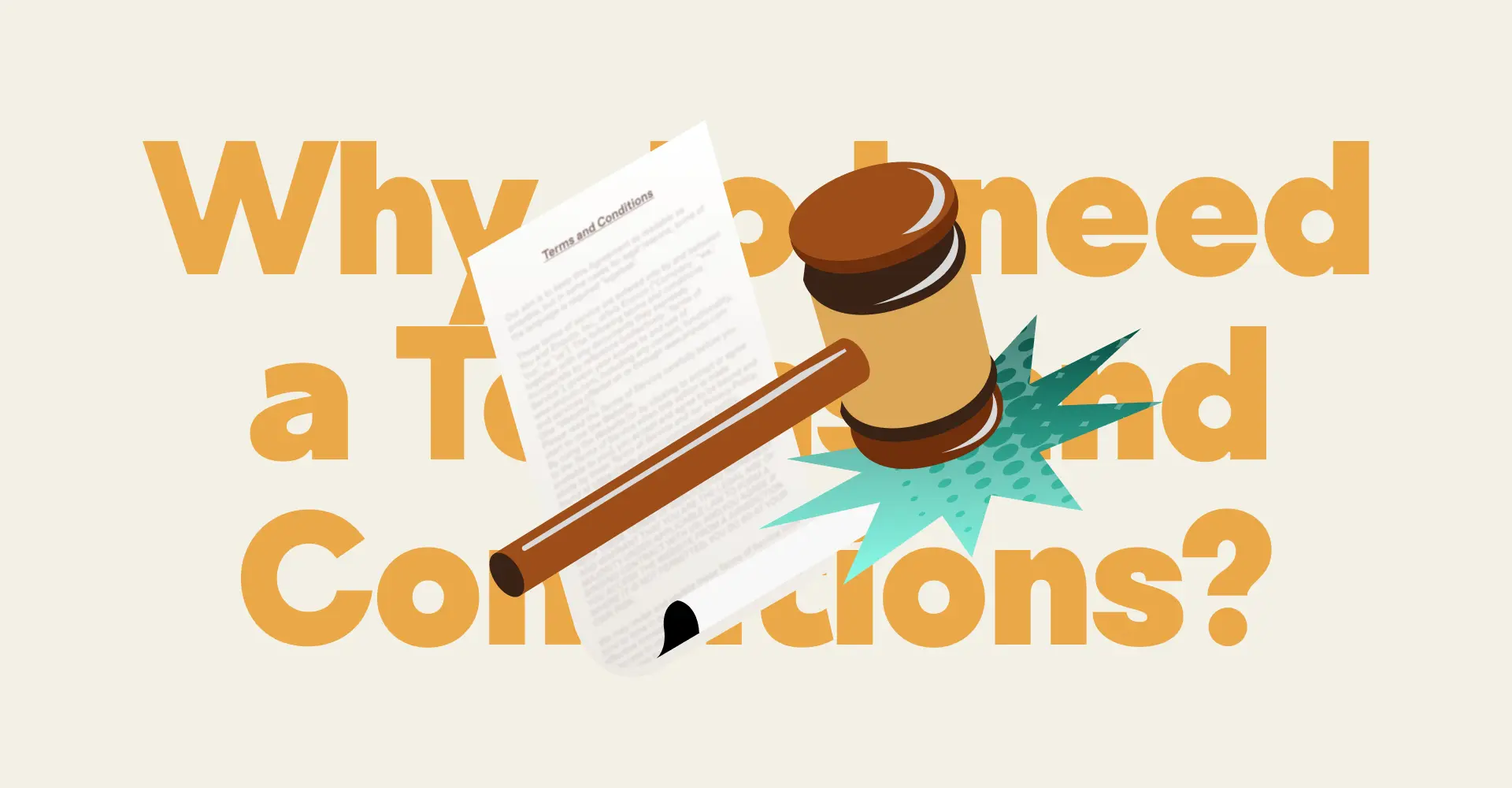6 Essential Reasons Why You Need Terms and Conditions

Table of Contents
If you’ve ever tried to install software on your computer or an app on your phone, chances are you’ve seen a long document called a terms and conditions page. This page prevented you from using the software or service you purchased until you gave your consent. Depending on how active you are with software, you may have given your consent to hundreds of agreements without ever knowing what they are or why you keep having to agree to them.
Despite how repetitive it may feel to scroll through them, terms and conditions pages represent one of the best ways to protect both businesses and customers in the modern world. In this post, we'll highlight all the reasons you need terms and conditions for your website or online store.
Is Terms and Conditions the Same as Terms of Service?
Yes! Terms and conditions, terms of service, and terms of use all mean the same thing. If you see any of them, assume that they're talking about the same issue.
Why You Need a Terms and Conditions on Your Website
Some of the major reasons to consider a terms and conditions page on your website include:
1. Terms and Conditions Keep Both Parties Protected
The saying goes that fences make for good neighbors. This is especially true for consumers and businesses. Maintaining a certain degree of separation between the two can ensure better protection for both. Businesses don’t want to be sued when consumers misuse their products and services. Similarly, consumers should be rightly concerned about what companies intend to do with the personal data that they give them when soliciting services.
Terms and conditions provide great protection to both sides of the business and customer relationship. The page can make it clear what customers can and cannot do while using their service. Similarly, terms and conditions pages can explain to customers their rights, including how to get proper arbitration if they find that businesses aren’t operating by their agreement.
For this reason, it is best that terms and conditions pages are kept simple enough that the average user can understand them without too much effort. Similarly, having demo pages or video explanations helping consumers understand what they can do with the service is a great compliment to terms and conditions pages that you may want to consider for your company.
2. Many Industries Have Specific Requirements for Terms & Conditions
Some regulations, such as those that govern the financial and banking services industry, have rules in place that require companies to inform their customers about their rights when using financial and banking services. Terms and conditions pages, when structured properly, can fulfill these requirements.
A few laws to be aware of include the following:
- Bank Secrecy Act/AML Rules: In response to a rise in money laundering, the United States passed the Bank Secrecy Act of 1970, also known as the Currency and Foreign Transactions Reporting Act. This law requires companies to monitor and report dubious transactions and suspicious consumer financial activity. This act is also important for modernizing anti-money laundering laws, or AML laws.
Why does terms and conditions matter? As part of the act, financial institutions should make their users aware that financial organizations have a responsibility to monitor and report suspicious activity. Terms and conditions pages can help organizations explain to customers why their financial activity is being monitored, and will also protect the organization from future legal trouble when they are forced to take action against concerning customers.
- USA Patriot Act/Customer Identification Program: In response to rising global tensions, the US passed the Patriot Act in October of 2001. As the act was chiefly concerned about national security, a large part of the legislation focused on making it easier for the government and other agencies to monitor civilian financial activity. To do this, the Patriot Act introduced Customer Identification Programs, or CIPS.
CIPS are federally mandated pieces of information that financial firms must collect from customers even though the Patriot Act has largely expired. Typically, the bare minimum that organizations must collect is name, date of birth, address, and some kind of identification number. With a terms and conditions page, companies can explain to consumers why they need this information, and have a safeguard in place in case a customer complains about improper collection of data beyond the scope of business.
- FINRA/Know Your Client: One more set of rules to be aware of that encourages the use of terms and conditions pages is the Financial Industry Regulatory Authority, or FINRA. FINRA is a private organization that acts as a regulatory body for the rest of the financial industry. While not part of the federal government, its role as regulator, enforcer, and arbitrator for brokerage firms, exchange markets, and other financial bodies make it second only to the U.S. Securities and Exchange Commission, or SEC.
There are two FINRA rules of special note when it comes to terms and conditions. Rule 2090 states that a financial organization must make a reasonable effort to explain the purpose of an account that they wish to open. Rule 2111 states that the organization must also make reasonable recommendations when working with the client. Terms and conditions can help satisfy both of these requirements by explaining the rights a customer has when interacting with a financial sector company.
3. Terms and Conditions Outline What Customers Cannot Do
Now more than ever, companies understand that they cannot afford to do business with all potential customers interested in their company. A few reasons for this include:
- Customers who can’t afford services,
- Customers who would tarnish the company brand by association
- Customers who are too young to make use of the
- Customers who don’t live in the right territory for your service
- Customers who repeatedly misuse your company's service
- Customers who you are required by law to cut off from your services
Whatever your reason, consumers can actually sue your organization for unlawful termination or the withholding of goods and services if a proper agreement isn't in place. By including a termination clause in a terms and conditions agreement, you have the right to terminate as your company desires while safeguarding your organization against termination litigation.
4. Terms and Conditions Limit Your Liability
Even the best made products and services don’t turn out perfectly. What do you do when a consumer is unhappy with your organization’s delivery? If you have a terms and conditions agreement, you’ll know the answer instead of having to go to arbitration. As long as you have a clearly outlined and legally approved terms and conditions agreement, you may be able to limit your liability when things go wrong.
Several factors that can impact whether a liability clause in a terms and conditions agreement will be upheld include:
- Illegal organizational activity
- Unreasonable organizational activity
- Repeated product or service failure
- If the business is knowingly and unfairly taking advantage of the customer
- If the organization is acting in good faith with other business partners and employees
In general, the better behavior an organization exhibits, the more likely their liability clause will be respected, while poor business behavior will defeat even the most well written liability protection. If you are interested in learning more about how liability clauses relate to terms and conditions, we highly recommend reviewing the SEC’s general guide on liability clauses in terms and conditions agreements, and to also review good liability samples available at Law Insider.
5. Terms and Conditions Help Ensure Enforcement
Courts regularly enforce pop-up Terms and Conditions agreements on websites. This can be important if you're embarking upon an intellectual property suit due to someone stealing your online content.
Requiring your users to agree to your Terms and Conditions before accessing your content is an integral part of preserving rights (like your IP rights), creating a safe space for your users, and protecting your interests when things do go wrong.
When a court deliberates whether to uphold your Terms and Conditions, they may consider the following questions:
- Was the agreement legible?
- Was the text written in legal jargon or easy to comprehend?
- Was the user aware they agreed to a contract?
- Was the full text of the agreement easily accessible?
If the court determines that the answer to any of these questions is no, they are less likely to uphold your Terms and Conditions. Another critical question a court is likely to consider is:
- Are the terms so unfavorable or restrictive to the user that they would be considered "unconscionable"?
If the court finds the agreement unconscionable, your Terms and Conditions won't be enforceable. Your agreement must walk a fine line. It should be comprehensive enough to cover important issues to your business but not so overly comprehensive as to be considered unconscionable.
For this reason, we don't recommend that you use a generic Terms of Service generator free of charge that you might find online. Your Terms and Conditions should be drafted by an expert in the field who can strike the right balance needed to ensure enforcement.
6. Terms and Conditions Help You Own Your Content
Many website owners include an intellectual property (IP) clause in their Terms and Conditions to claim ownership of IP on the site. IP can include your logo, content, images, and site design.
It's good to include a statement in your Terms and Conditions that users agree not to redistribute or reproduce your content without your consent.
Protecting your IP rights is essential. If you don't protect your content, it's easy to lose it to someone else.
Speaking of malicious users, another reason to implement comprehensive Terms and Conditions for your business is to prevent abuse. Your Terms and Conditions agreement enters you into a legally binding contract with your users. You can set the guidelines that your users must obey if they wish to continue using your site.
You can use your Terms and Conditions agreement to explain the repercussions of abuses. Examples of abuses you may choose to take action against include:
- Spamming your users
- Using foul language
- Posting defamatory content
- Posting lewd content
You can even use it to regulate political postings or the type of topic allowed. Users who fail to follow your rules will face the repercussions in your Terms and Conditions.
Website users generally appreciate a good moderator who prevents other users from wasting their time or posting offensive content. A well-drafted Terms and Conditions agreement can keep your website on target and avoid alienating valued users.
Are Terms and Conditions Legally Binding?
In general, yes. Terms and conditions are legally bindinding in many territories around the world, including the United States and Europe Union. However, certain requirements must be met for the agreement to be considered legally binding. While these requirements vary from territory to territory, the most common requirements are:
- Proof of consent. You must show that your customer is actively engaged with your terms and conditions page before using the service. Depending on the territory and the rights described within, it may not be enough to just have a terms and conditions page posted on your website. You must force your customer to examine it and accept it before agreeing to use your service.
- Ease of understanding. Many consumers have encountered a terms and conditions agreement that drags on for hundreds of pages and is written in a way that is nearly impossible for the average customer to understand. More often than not, these agreements are not found to be legally binding. To protect your company, it is vital that your terms and conditions agreement is written in such a way that the average user can reasonably understand what they are agreeing to when using your service.
- Consideration. According to contract law, an agreement cannot be in place if one side of the agreement does not actually benefit from the acceptance of the agreement. This is called consideration, and it is vital that it is outlined in the terms and conditions page. Even if everything else is present, including an easy to understand contract and the option to accept it, an agreement is not legally binding if it does not clearly specify the benefits the customer gains by accepting it.
- Is legally valid in your territory. Lastly but just as importantly, your terms and conditions agreement will need to abide by the regulations concerning agreements in your territory. There may be additional or specific rules about what has to be included, including stipulations about the language that can be used or what can be traded as part of the agreement transaction. You may want to consider contacting a lawyer or using a legally backed terms and conditions generator like Enzuzo to satisfy this requirement.
Build Customized Terms and Conditions With Enzuzo
As explained above, there are many reasons why you should have a terms and conditions agreement incorporated into your site or service. Need some help creating a customized page that reflects your company but don’t want to use a lawyer? Get the next best thing by partnering with Enzuzo and using our legally-vetted data privacy platform and page generator.
The Enzuzo data privacy platform has many features, chief among them being our terms of service page generator. This is one of the easiest ways to make a comprehensive, legally binding terms and conditions page for your company, and you can even make it for free! Answer some questions, follow our easy setup, and you can generate a terms of service agreement that you can use on websites, Saas and eCommerce platforms, phone apps, and more.
There are a few other great benefits besides ease of use. Data privacy regulations like GDPR or CCPA are constantly evolving, making it hard to keep up with the latest legislative changes. By using the Enzuzo platform, your terms of service pages will update automatically. You can also protect your company by generating other key legal policies, including privacy policy, EULA, return and shipping policies, and more.
Want to give our generator a try? Then book a demo to see it in action, or contact us today to find out if it's the right fit for you. We look forward to helping you protect your organization while improving the customer experience when you rely on the Enzuzo data privacy platform.

Paige Harris
Paige is the growth marketing lead at Enzuzo and host of The Living Lab podcast, providing insightful articles in the privacy space.
